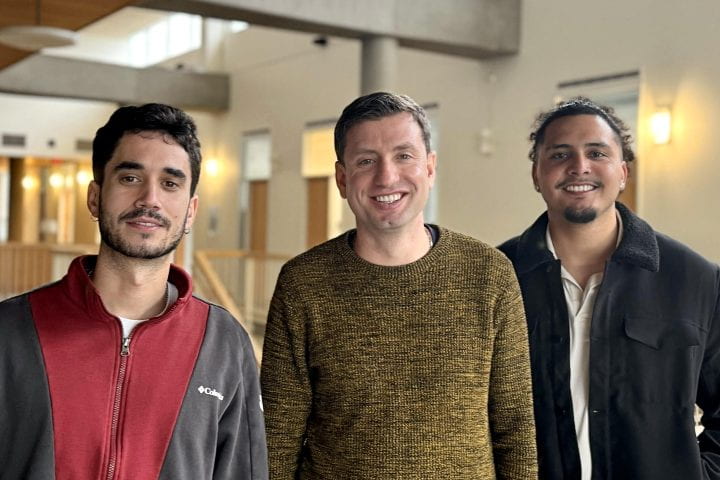UC Irvine-led research team discovers role of key enzymes that drive cancer mutations
APOBEC3A and APOBEC3B offer potential new targets for intervention strategies

Irvine, Calif., March 18, 2024 — A research team led by the University of California, Irvine has discovered the key role that the APOBEC3A and APOBEC3B enzymes play in driving cancer mutations by modifying the DNA in tumor genomes, offering potential new targets for intervention strategies.
The study, published today online in the journal Nature Communications, describes how the researchers identified the process by which APOBEC3A and APOBEC3B detect specific DNA structures, resulting in mutations at distinct positions within the tumor genome.
“It’s critical to understand how cancer cells accumulate mutations leading to hot spots that contribute to disease progression, drug resistance and metastasis,” said corresponding author Rémi Buisson, UCI assistant professor of biological chemistry. “Both APOBEC3A and APOBEC3B were known to generate mutations in many kinds of tumors, but until now we did not know how to identify the specific type caused by each. This finding will allow us to develop novel therapies to suppress mutation formation by directly targeting each enzyme accordingly.”
In this study, graduate student Ambrocio Sanchez and postdoctoral fellow Pedro Ortega, both in Buisson’s laboratory at the UCI School of Medicine, developed a new method to characterize the particular kind of DNA modified by APOBEC3A and APOBEC3B. It revealed that the two enzymes do not recognize the same DNA sequences and structures within the genomes of cancer cells. Based on this observation, an innovative approach utilizing these unique target preferences was employed to classify cancer patients who had accumulated mutations caused by each enzyme.
“The next steps are to investigate whether mutations caused by these enzymes lead to various types of therapy resistance. It’s also critical to identify molecules that inhibit APOBEC3A and APOBEC3B to prevent mutations from forming. Our findings could, in the future, help to assess patient risk before treatment and suppress tumor evolution using the appropriate drug therapy,” Buisson said.
Other team members included undergraduate and graduate students and postdoctoral fellows from UCI, Harvard Medical School, the University of Southern California, the University of Texas at San Antonio and the University of Minnesota.
This work was supported by the National Institutes of Health’s Research Supplements to Promote Diversity in Health-Related Research program under award R37-CA252081-S; California Institute for Regenerative Medicine stem cell biology training grant TG2-01152; European Molecular Biology Organization postdoctoral fellowship ALTF 213-2023; Cancer Prevention and Research Institute of Texas research training award RP 170345 and Recruitment of Established Investigators award CPRIT RR220053; the National Cancer Institute under awards R37-VA252081 and P01-CA234228; the National Institute of Allergy and Infectious Diseases under award R01 AI150524; and access to UCI’s Genomics Research and Technology Hub, affiliated with the Chao Family Comprehensive Cancer Center, under grant P30-CA062203.
UCI’s Brilliant Future campaign: Publicly launched on Oct. 4, 2019, the Brilliant Future campaign aims to raise awareness and support for UCI. By engaging 75,000 alumni and garnering $2 billion in philanthropic investment, UCI seeks to reach new heights of excellence in student success, health and wellness, research and more. The School of Medicine plays a vital role in the success of the campaign. Learn more by visiting https://brilliantfuture.uci.edu/uci-school-of-medicine.
About the University of California, Irvine: Founded in 1965, UCI is a member of the prestigious Association of American Universities and is ranked among the nation’s top 10 public universities by U.S. News & World Report. The campus has produced five Nobel laureates and is known for its academic achievement, premier research, innovation and anteater mascot. Led by Chancellor Howard Gillman, UCI has more than 36,000 students and offers 224 degree programs. It’s located in one of the world’s safest and most economically vibrant communities and is Orange County’s second-largest employer, contributing $7 billion annually to the local economy and $8 billion statewide. For more on UCI, visit www.uci.edu.
Media access: Radio programs/stations may, for a fee, use an on-campus ISDN line to interview UCI faculty and experts, subject to availability and university approval. For more UCI news, visit news.uci.edu. Additional resources for journalists may be found at https://news.uci.edu/media-resources.